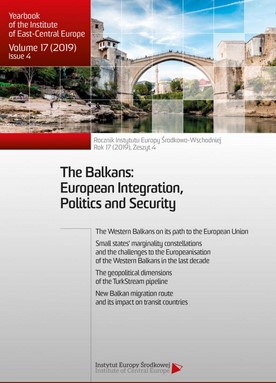Dynamics of the Serbian EU accession process – key issues and the challenges of state democratisation in an era of populism
Dynamics of the Serbian EU accession process – key issues and the challenges of state democratisation in an era of populism
Author(s): Mirella Korzeniewska-WiszniewskaSubject(s): Political history, Economic policy, Government/Political systems, International relations/trade, Political behavior, Politics and society, Transformation Period (1990 - 2010), Present Times (2010 - today), EU-Approach / EU-Accession / EU-Development
Published by: Instytut Europy Środkowej
Keywords: Serbia; democratisation;
Summary/Abstract: The current Serbian authorities (aligned with the Serbian Progressive Party) have pushed Serbia towards effective reforms over the past several years and improved its image on the international arena through an intensified diplomatic offensive after 2015. This has led to a situation in which the Serbian state became a political and economic partner in both regional and integration projects. The latter is demonstrated by the arduous but progressive accession process to the European Union. After 2000, international and Serbian public opinion greeting the end of the regime of Slobodan Milošević expected rapid democratisation of the state based on statements by Serbian politicians who had declared a West European course of the state. The short-lived rule of Prime Minister Zoran Đinđić, confirmed this; however, the policy of his successors was no longer so unambiguous. For almost a decade, Serbia oscillated between populism and declared democratisation, without making major changes, expected by both society and the European Union. When after the year 2012 the Serbian Progressive Party came to power (the party was founded as a conservative grouping and had radical roots), it seemed that the Serbian state would be pushed towards a more conservative, anti-European and nationalist direction. However, that did not happen. Opinion about the last six years of the group’s rule is varied. This paper aims to try to answer the question whether during the party’s rule, Serbia has been democratising and whether in this era of nationalist movements and populism, the country has a chance at real democratisation and finishing the process of accession to the EU?
Journal: Rocznik Instytutu Europy Środkowo-Wschodniej
- Issue Year: 17/2019
- Issue No: 4
- Page Range: 49-77
- Page Count: 29
- Language: English

